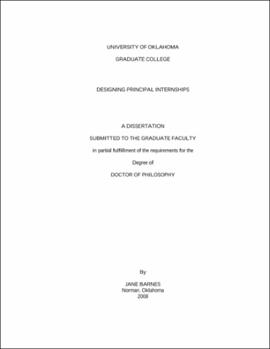| dc.contributor.advisor | Vaughn, Dr. Courtney | |
| dc.creator | Barnes, Jane Lucillle | |
| dc.date.accessioned | 2019-04-27T21:40:13Z | |
| dc.date.available | 2019-04-27T21:40:13Z | |
| dc.date.issued | 2008 | |
| dc.identifier | 9973691102042 | |
| dc.identifier.uri | https://hdl.handle.net/11244/319317 | |
| dc.description.abstract | My dissertation is based on the process I used to design a Principal Internship Program for aspiring school leaders. I used heuristic methodology to describe a principal internship from the perspective of intern and my role as Director of Leadership Development. It was important for me to embrace my own experience and insight into this occurrence as the director of a new program; hours were spent analyzing my own decision making and choices in this new leadership position. I purposely incorporated other educators voices in this dialogue that have participated in the internship and included them as participants in my research project; their voices, as interns chosen to implement a new district initiative to replenish departing principal leadership, gave credence to my research. | |
| dc.description.abstract | The initial step in designing the program was a literature review of the historical development of the principalship and the need for internships. This review identified for me the necessity to create an internship design founded on collaborative distributive leadership practices based on Adult Learning Theory. The second step of my journey was to identify the adult learning theory models that would have a positive impact on this internship. | |
| dc.description.abstract | This study generated grounded theory and a lens to scrutinize my curriculum design. It identifies program practices interns associate as positive; and program practices interns associate as negative; to further develop and improve future principal internship programs. Program success is identified as internship practices that support participant experiences to improve leadership knowledge, skills, attitudes, and beliefs in the areas of instructional leadership, community leadership, and management and leadership structures that promote student achievement. | |
| dc.description.abstract | My findings speak to the importance of principal internships; internships that consist of an inclusive mentor, a collaborative cohort learning community, learning in context supported by reflective practice and opportunities to practice problem solving in context. As part of this research and my dissertation process, I have identified an additional component that needs to be a part of the internship model. This component is the conscious training and application of adult learning theory as part of the preparation for aspiring leaders and mentors. Adult learning theory lays the foundation of forming school culture and building collaborative relationships used to create and advance professional learning communities that improve student achievement. We must leave nothing to chance in the intern's understanding of working with adults in their new leadership position. | |
| dc.format.extent | 131 pages | |
| dc.format.medium | application.pdf | |
| dc.language | en_US | |
| dc.relation.requires | Adobe Acrobat Reader | |
| dc.subject | School principals--Training of | |
| dc.title | Designing Principal Internships | |
| dc.type | text | |
| dc.type | document | |
| dc.thesis.degree | Ph.D. | |
| ou.group | Jeannine Rainbolt College of Education::Department of Educational Leadership and Policy Studies | |
